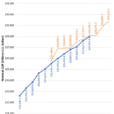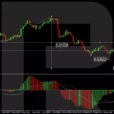With stocks tumbling and bonds and bullion bid, Wall Street’s best and brightest weigh in on what traders should expect next after news of the cruise missile attack.
Investors are looking for response from Russia and other countries to gauge market impact of the U.S. strike on Syria (via Bloomberg)
Westpac Banking Corp (Sean Callow, senior strategist)
“Markets should have been prepared for U.S. military action given Trump’s comments but the strike was on the early side of expectations, especially since it occurred halfway through the Trump-Xi meeting.”
“While we have probably already seen the sharpest market response, there is likely to be a lingering sense of unease over how quickly Trump switched from rhetorical support for the Syria/Russia storyline about fighting terrorists.”
Sumitomo Mitsui Trust Bank (Ayako Sera, market strategist)
“This was a huge surprise, especially at this timing, when Trump is meeting with Xi. People expected North Korea to be on the table as things weren’t going smoothly internally in the U.S. and wanted to focus on external policies — but instead, it was Syria where he took action.”
“Whether the market reaction is temporary or will continue will depend on the reactions from the international community.”
“Hopefully Russia will also be critical of Syria’s gas attack, but without international unity it’s a negative for the U.S.”
Scotiabank (Gao Qi, currency strategist)
“Markets will be paying more attention to political and event risks, so it’d be risk-aversion trade going forward. Under such circumstances, emerging-market currencies, including the yuan, tend to be weaker, while the safe-havens like yen would be stronger. Whether it’d turn out to be knee-jerk reaction or medium-term trend, it’d depend on how things evolve in Syria and North Korea.”
AMP Capital Investors (Shane Oliver, head of investment strategy)











Leave A Comment